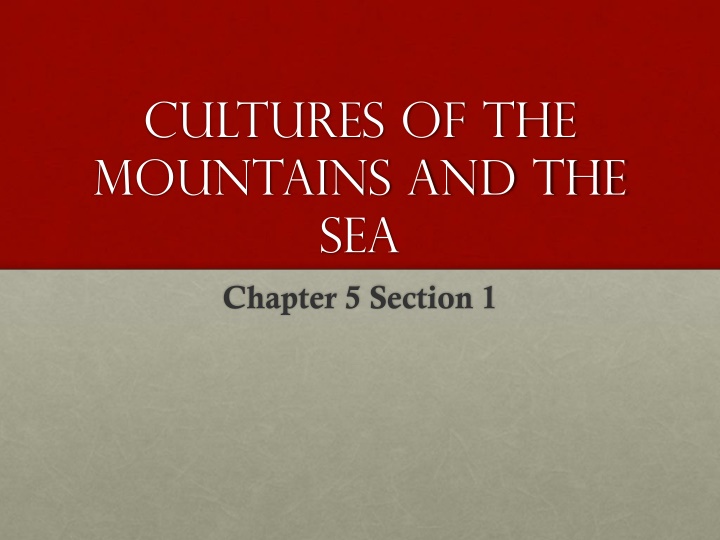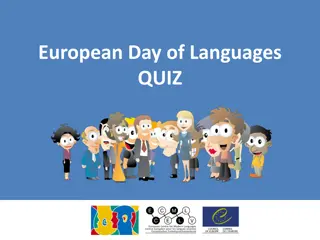
Greece: Ancient Cultures of Mountains and Sea
Explore the early Greeks, including the Mycenaeans and the Trojan War, as well as the impact of sea proximity on Greek development. Discover the adoption of cultural aspects, epics' significance, and the role of myths in Greek society.
Download Presentation

Please find below an Image/Link to download the presentation.
The content on the website is provided AS IS for your information and personal use only. It may not be sold, licensed, or shared on other websites without obtaining consent from the author. If you encounter any issues during the download, it is possible that the publisher has removed the file from their server.
You are allowed to download the files provided on this website for personal or commercial use, subject to the condition that they are used lawfully. All files are the property of their respective owners.
The content on the website is provided AS IS for your information and personal use only. It may not be sold, licensed, or shared on other websites without obtaining consent from the author.
E N D
Presentation Transcript
Cultures of the Mountains and the Sea Chapter 5 Section 1
Mycenaean The earliest Greeks, name comes from the city-state Mycenae.
Trojan War War between the Early Greeks and the City of Troy about 1200 B.C. , fought over trade (& Helen of Troy).
Dorian Less advanced northern cousins of the southern and coastal Greeks. Moved in after the sea peoples destroyed the Mycenaeans shortly after the Trojan war. Greek dark age begins: no written language - rich oral story tradition develops - Homer s epics.
Homer One of the greatest of the Greek Storytellers: author of The Iliad and Odyssey.
Epic A very long poem / story.
The Iliad Homer s Epic story of the Trojan War
Myth Traditional stories that convey a moral idea, explains nature, or how the world works. For the Greeks myths represented their ideas about religion (the gods of Mt. Olympus), their history (Trojan War), and the world.
3. What impact did nearness to the sea have on the development of Greece? Being close to the sea made the Greeks a seafaring people, this helped them to: Learn the best other cultures had to offer (cultural diffusion). Ex: adopting the Phoenician alphabet from the Minoans. Allows them to take advantage of TRADE.
4. What aspects of culture did the Mycenaeans adopt from the Minoans? The Mycenaeans adopted the alphabet and pottery as well as religious ideas and myths (the Minotaur).
5. Why were the epics of importance to the Greeks of the Dorian period? The epics were important b/c the Greeks lacked writing at this time and the epics were a source of history and a common identity.
6. How did the physical geography of Greece cause Greek speaking peoples to develop separate, isolated communities? The MOUNTAINS of Greece isolated each Greek settlement from each other, eventually these isolated communities would become city-states that were fiercely independent of each other but shared a common language and cultural tradition.
7. Other than the explanation offered in the legend, why do you think the Greeks went to war with Troy? The Greeks went to war over TRADE b/c TRADE = $$ = POWER! Troy was strategically located it controlled the Hellespont, the point at which all sea travel from the Black Sea (& sea of Marmara) must pass to get to the Aegean Sea (and Mediterranean).






















